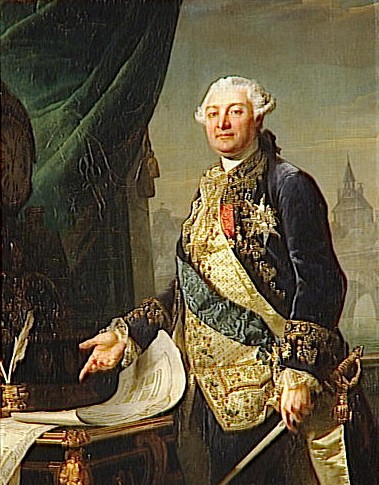<Back to Index>
- Mathematician Olga Alexandrovna Ladyzhenskaya, 1922
- Architect Filippo Juvarra, 1678
- Prime Minister of France Louis Charles Auguste le Tonnelier baron de Breteuil, 1730

Louis Charles Auguste le Tonnelier, baron de Breteuil, baron de Preuilly (7 March 1730 – 2 November 1807) was a French aristocrat, diplomat, statesman and politician. He was the last Prime Minister of the Bourbon Monarchy, appointed by King Louis XVI only one hundred hours before the storming of the Bastille.
Breteuil was born in 1730 at the chateau of Azay-le-Ferron (Indre)
into a well-connected aristocratic family: one of his relations was
confessor to the king's cousin and another was the famed mathematician
and linguist Émilie, marquise du Châtelet-Laumont. He received an excellent education in Paris and later joined the army, where he fought in the Seven Years' War. In 1758 he left the army and joined the French Foreign Ministry. He was quickly appointed French ambassador to the elector of Cologne, where he proved to have valuable diplomatic skills. Two years later he was sent to St Petersburg as the French ambassador to Imperial Russia, where he arranged to be temporarily absent from his post at the time of the palace revolution by which Catherine II was placed on the throne. In 1769 he was sent to Stockholm (Sweden), and subsequently represented his government at Vienna (Habsburg Monarchy), Naples (Kingdom of Naples), and again at Vienna until 1783. In Sweden, he became a favourite friend of the young King Gustavus III, but Catherine the Great of Russia disliked him. Others saw Breteuil as a loud and impulsive fool, Joseph II and several high-ranking Austrian politicians sneered at the "fool" behind closed doors. After he returned to France, Breteuil was appointed Minister of the King's Household. In this capacity he introduced considerable reforms in prison administration. He was a liberal and humanitarian minister, and succeeded in moderating the censorship laws. He believed passionately that the monarchy should encourage intellectuals, and not view them as enemies. Breteuil's time as Household Minister corresponded with the infamous Affair of the Necklace, which pitted him against his enemy, the Cardinal de Rohan. Breteuil's loyalty to Queen Marie Antoinette earned
him her gratitude and trust at this difficult time. Unfortunately,
Breteuil underestimated the strength of public sympathy for those
responsible, and his direct attack on Rohan left the Queen open to
public humiliation. He presently came into collision with Charles Alexandre de Calonne, who demanded his dismissal in 1787. On
24 July 1788, Breteuil resigned, exhausted by the struggle for power in
the King's Council. He then asked to be allowed to say farewell to the
queen. Marie-Antoinette did not resent him for his handling of the
affair, and even promised to help him in future if she could. In coordination with Marie Antoinette's favourite, the Swedish count Axel von Fersen,
Breteuil organised the royal family's escape from Paris in 1791,
garnering support from King Gustavus III of Sweden. The attempt almost
succeeded, but was foiled at the last minute by Jean-Baptiste Drouet, the Republican son of a local postmaster. It was also Breteuil who negotiated with the monarchies of Europe to persuade them to fight the French Revolution. After the failure of the flight to Varennes,
Breteuil received instructions from Louis XVI, designed to restore
amicable relations with the princes. His
attempts were ultimately in vain. The Bourbon monarchy in France was
overthrown in 1792, followed by massacres of many Royalists in Paris.
In January 1793, Louis XVI was executed. In October, Marie Antoinette
met a similar fate. In 1795, their son, Louis XVII died in prison. Breteuil
himself was the object of violent attacks from the party of the
princes, who asserted that he persisted in exercising powers which had
been revoked by Louis XVI. After the execution of Marie Antoinette he
retired into private life near Hamburg. Breteuil spent the next decade
in exile. His loyalty to the House of Bourbon had
ended with the death of the little boy-king in 1795. He was hated by
Louis XVI's two surviving brothers, particularly by the comte d'Artois. Breteuil was allowed to return to France in 1802 by Napoleon Bonaparte, having made his peace with the First French Empire.
He tried to urge other Royalists to join him, but he was largely
unsuccessful. Most preferred to stay loyal to the exiled Bourbons.
Breteuil died in France in 1807. A Bourbon Restoration occurred in 1814, but was deposed again by the 1830 July Revolution.